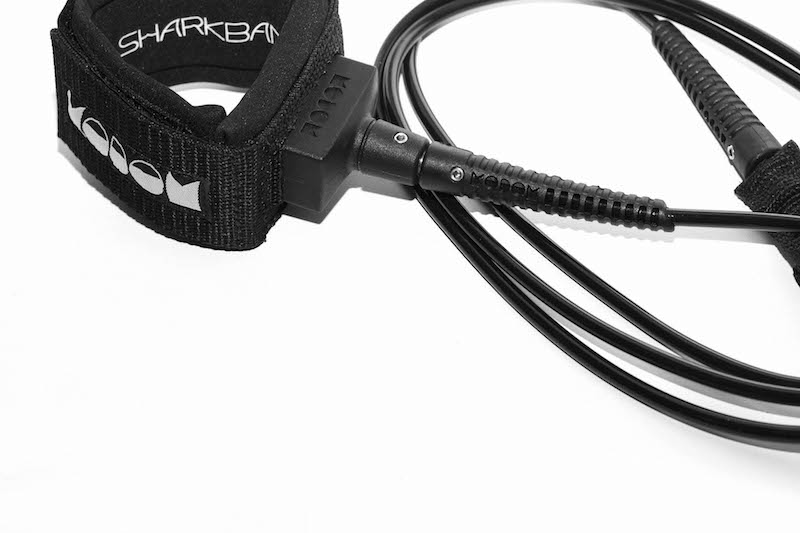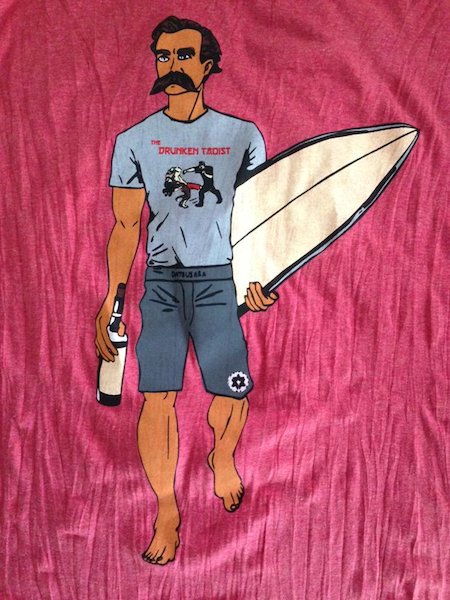Let's ask a shark scientist!
Does Modom think you’re an idiot? If so, they might be right.
First news of their new “shark deterrent leash” dropped on Stab/Stitch‘s website a couple months back.
Titled This Shark Leash Is The Most Desirable Surf Tech In The World Right Now! the piece was a particularly disingenuous piece of marketing.
“Modom didn’t give us a cent for what you read here (yes, we’d tell you). We’re just fucking thrilled to have something that’s potentially effective at discouraging sharks.”
Very nice. So much concern. Totally impartial. No conflict of interest there. Surfstitch definitely isn’t looking to earn a buck middle-manning the product. Oh no, this is truly a humanitarian effort. Using the power of magnets to save life and limb!
Modom’s magnet leash sprung from a license agreement with SharkBanz, a subsidiary of SharkDefense, which is a New Jersey based company founded by Eric and Jean Stroud in 2001. SharkDefense is the proud owner of numerous shark repellent patents. In addition to magnets, they also sell a line of Batman style shark repellent spray.
Considering the company employs numerous “scientists,” it’s worrying that there is a total lack of peer review or access to any of their “research” data.
Sure, they have some “research” posted on their site, but it amounts to little more than a collection of data gathered by others, with no indication of how they proceeded with real world testing.
Lucky for us there are concerned citizens willing to double check claims for them.
Take a gander at the following video. Does an excellent job demonstrating the efficacy of the Sharkbanz’ magnetic wonder.
Oops!
The shark targeted and ate the magic magnet.
What’s going on? Does this mean it doesn’t work?
Nope. Still totally works, they claim.
Sharkbanz are not designed to prevent sharks from eating visible bait. They have a hierarchy of senses and can override the electrical sense in the event that visible bait is present. Again, Sharkbanz are meant to deter curious sharks from biting a person while in investigative mode, not prevent them from eating bloody fish bait.
An interesting claim, kind of surprising considering “The testing was performed using baited fake legs with the leash cuff connected.” Their heavily edited videos purporting to demonstrate efficacy use the same method.
But what do I know? I’m no sharkologist.
All this is just arm chair speculation based on lack of evidence and contradictory marketing material. I really need to talk with someone in the know. Ideally that would be a person who studies the creatures for a living and doesn’t have an economic interest in promoting the product.
So I emailed Dr. Carl Meyer, member of the shark and reef fish research team at the Hawaii Institute of Marine Biology.
I’m yet to see any rigorous testing on Sharkbanz carried out by independent scientists, and I am fundamentally skeptical about the ability of these devices to deter sharks from biting people. Decline in magnetic field strength is governed by the inverse square law. Thus even a couple of inches from your Sharkbanz the magnetic field is extremely weak – weak magnetic fields do not inherently repel sharks. Basically, the device has a very small magnetic footprint – most of your body will not be within this footprint.
The inverse square law states that “a specified physical quantity or intensity is inversely proportional to the square of the distance from the source of that physical quantity.”
Confusing, yeah?
That basically means that the magnetic field gets exponentially weaker the further you get from the magnet. This graphic helped me wrap my head around the concept.
Dr Meyer continued, “I’ve seen some research data showing aversion to solid state magnets by small sharks held in close proximity to the magnet. The problem is that field strength is declining exponentially with distance from the magnet, so to a propagate a strong magnetic field over an area the size of a human body would require a tremendously powerful magnet (=large magnet) at the field center. For full effectiveness, we would also need to understand the minimum magnetic field strength threshold for shark repulsion, and design a field that was at least this strong immediately surrounding our body. This threshold will likely vary as a function of shark species, size and motivational state.”
Basically, even if it works (it doesn’t), the Modom leash will only protect the foot your leash is attached to. The other leg, your arms, your head, they’re still up for grabs.
Worrying information considering the fact that marketing rhetoric has compared the leash to seat belts and helmets. Two things which actually provide real, demonstrable, benefits as opposed to a placebo effect based on specious voodoo science.
Dr Meyer agrees.
The biggest problem I have with devices like Sharkbanz is that people are clearly buying them with the belief that they will be either entirely protected from shark bites, or at least less likely to be bitten. Neither of these facts have been scientifically proven, and there are fundamental reasons why these devices are unlikely to deter a shark from biting you. These devices are in a grey area, exploiting peoples fears, without being held to the high standards required of other safety devices (i.e. that they actually work). The burden of proof of effectiveness is on the manufacturer, and in my opinion, they are a long way from demonstrating effectiveness in preventing shark bites.
Of course, there’s no getting through to some people. Just like we saw a million morons harnessing the power of magnets to enhance their balance, there will no doubt be a rush of halfwits and cowards all too eager to drop $250 on a leash with a magnet attached.
Pretty crazy price point, especially considering it’s just a normal leash with a neodynium magnet attached. The same type of magnet you can buy on Amazon for under twenty bucks.
It’d be damn easy to rig one of those things to a leash, maybe wrap a cord around it and fashion a necklace. It’d not work just as well, and you could spend the balance on whatever it is that dumb dumbs blow their dough on. ICP concerts and lottery tickets, I suppose.







